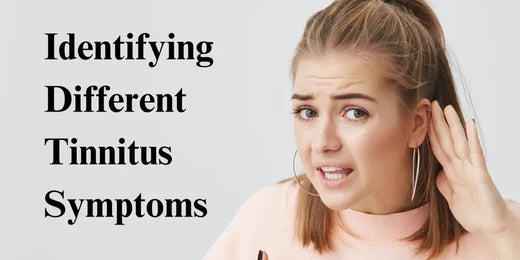
Identifying Different Tinnitus Symptoms
Share
Tinnitus can be extremely difficult to deal with, and it is frequently described as a continuous, variable-pitched ringing, buzzing, or hissing sound in the ears. It appears as constant background noise for some people and as sporadic noise for others. This condition can adversely affect sleep quality, impair concentration, and exacerbate stress and anxiety levels. Consequently, tinnitus can have a considerable impact on overall well-being. Therefore, it is important to examine the signs and symptoms associated with the various types of tinnitus in greater detail.
Table of Contents
Pulsatile Tinnitus Symptoms

Pulsatile tinnitus is a type of tinnitus characterised by a rhythmic sound that aligns with the heartbeat, differing from the typical ringing or buzzing associated with regular tinnitus. Symptoms include:
- Rhythmic Sound: A pulsing or throbbing noise that syncs with the heartbeat.
- One Ear or Both: It can occur in one ear (unilateral) or both (bilateral), often more prevalent in one ear.
- On and Off or Constant: The sound may be intermittent or constant, often more noticeable in quiet environments.
- Volume and Intensity: The loudness can vary from faint to loud.
- Other Symptoms: While the rhythmic sound is the main symptom, pulsatile tinnitus can come with other symptoms depending on what’s causing it. These might include:
- Hearing loss
- Dizziness or spinning
- Headaches or migraines
- Emotional effects like anxiety or trouble focussing.
Neurological Tinnitus Symptoms
Neurological tinnitus is ringing or buzzing in your ears because of some issues with your nervous system. It can feel a bit different from usual tinnitus, and it might hint at some underlying neurological problems. Let’s look at some symptoms you might experience:
- Sounds You Might Hear:
- You might hear unusual noises in place of the usual ringing, such as pulsations, clicks, or irregular, rhythmic beats.
- At times, there may be simultaneous buzzing, clicking, and ringing.
- Location and Time of Event:
Depending on what is happening neurologically, it can affect either one or both ears and may appear suddenly.
- Other neurological signs:
- More noticeable hearing loss.
- Dizziness and balance issues.
- difficulties focussing, remembering things, or coordinating your movements.
- Intensity and changes:
- Your nervous system's condition will determine how loud your tinnitus is.
- Some people may have increased sound sensitivity, which can exacerbate tinnitus symptoms.
- Soreness or Unease:
- Tinnitus linked to neurological issues may be accompanied by headaches or migraines.
- The neurological issue may be the cause of any ear pain you experience.
Cervical Tinnitus Symptoms
One type of tinnitus that is believed to be associated with problems with the cervical spine, such as tension or disorders of the neck, is called cervical tinnitus. Physical conditions affecting the cervical spine and its surrounding structures are frequently linked to this type of tinnitus. Below is a comprehensive summary of the signs and symptoms of cervical tinnitus:
Symptoms of Cervical Tinnitus
The sounds produced by tinnitus can range from intricate noises to ringing, buzzing, or hissing sounds. It may also have a pulsing or throbbing character that can be influenced by neck movements or posture.
Cervical tinnitus symptoms often relate to neck movements or positions, with changes in posture, such as moving from lying to sitting, potentially increasing the intensity or awareness of the tinnitus.
- Some individuals experience discomfort or pain in the upper back, shoulders, or neck, which may occur continuously or sporadically.
- This cervical tinnitus can be associated with headaches, particularly tension-type or cervicogenic headaches linked to neck issues.
- Additionally, some may feel dizziness or unsteadiness related to neck movements. Increased muscle tension in the neck or upper back may exacerbate tinnitus symptoms.
- The degree of cervical tinnitus may differ depending on the neck position, the tension in the muscles, or the activity that involves the neck.
- Tinnitus symptoms may momentarily improve or subside if specific physical therapy exercises are performed or if one's neck posture is adjusted.
- A fullness or pressure in the ears may be felt by some people, and this can occur concurrently with or worsen from tinnitus.
- Less frequently, but still possible, neck-related subtle changes in hearing could include diminished hearing sensitivity or distortion.
Somatic Tinnitus Symptoms

Somatic (physical) factors can affect or modulate somatic tinnitus development. It involves tinnitus that is influenced by physical factors such as muscle tension, changes in body posture, or other factors. Here’s a detailed overview of the symptoms and characteristics associated with somatic tinnitus:
Symptoms of Somatic Tinnitus
- Type of Sound:
- Onset and Fluctuation
- Certain movements of the jaw, neck, or body may cause the tinnitus to change or fluctuate.
- Modifications to one's body posture, such as standing, lying down, or tilting the head, can affect how tinnitus is perceived.
- Associated symptoms:
Neck stiffness and pain can worsen tinnitus, particularly when associated with jaw clenching and TMJ disorders. Tension headaches or cervicogenic headaches may also arise with somatic tinnitus, often related to muscle tension or spinal problems.
- Tinnitus intensity can vary due to physical factors such as muscle tension, posture, and movement, affecting the perceived loudness of sounds. Increased muscle tension in areas like the jaw, shoulders, or neck may accompany tinnitus, and sensations of fullness or pressure in the ears can also be related to changes in posture or body alignment.
Eye Tinnitus Symptoms
Eye tinnitus is a term that may be used to describe a phenomenon where tinnitus symptoms seem to be linked with eye movements or visual stimuli. While eye tinnitus isn't a widely recognised medical term, the concept can relate to various interactions between auditory and visual systems. Here’s a detailed look at symptoms and associated experiences:
Symptoms Associated with Eye Tinnitus
- Some individuals experience changes or intensification of their tinnitus in response to eye movements, like blinking or looking around.
- Additionally, visual stimuli, such as bright lights or moving objects, may also influence the perception of tinnitus.
The tinnitus might be described as ringing, buzzing, or hissing, and its perception might change when engaging in activities involving eye movements.
Tinnitus intensity can vary with visual stimuli or eye position changes, often becoming more noticeable during activities that require visual focus or cause eye strain.
- Some individuals may experience eye strain, discomfort, or fatigue that can influence their perception of tinnitus.
- These eye-related issues may also be linked to headaches or migraines, which can further impact tinnitus.
In some cases, individuals might report visual disturbances, such as seeing spots or flashes of light, that seem related to changes in tinnitus.
Allergy Tinnitus Symptoms
Allergy tinnitus refers to tinnitus that is thought to be associated with allergic reactions or conditions. Allergies can cause a range of symptoms, and in some cases, they might contribute to or exacerbate tinnitus. Here’s a detailed look at the symptoms and how allergies might influence tinnitus:
Symptoms of allergy-related tinnitus
- Type of Sound:
There are several different types of tinnitus sounds, including buzzing, hissing, and ringing. Although the particular kind of sound may be impacted by the allergy condition, it is not always distinct from other types of tinnitus.
- Time and Variability:
Tinnitus can worsen during or after exposure to allergens like dust, pollen, or pet dander, particularly for those with seasonal allergies, making it more noticeable during allergy season.
- Associated symptoms:
- Fullness or pressure in the ears can occur due to allergies impacting the Eustachian tube, resulting in muffled hearing or conductive hearing loss.
- Allergies may also lead to tinnitus, which can worsen with nasal congestion and sinus pressure and may be associated with itching in the ears or throat.
- Impact of Allergic Medications:
Certain antihistamines and decongestants used to treat allergies may cause medication-induced tinnitus as a side effect. If you start or stop taking allergy medication, it is crucial to keep an eye on any changes in tinnitus.
Frequently Asked Questions:
What is the best cure for tinnitus?
A customised treatment that works best for you is the best option for tinnitus. It might call for combining techniques like stress management, behavioural therapy, and sound therapy. It is advisable to speak with medical specialists who specialise in tinnitus to determine the best course of action for you.
What is the simple trick to stop tinnitus?
While there is not a single treatment for tinnitus, there are a number of approaches that can help manage symptoms, such as earplugs, white noise therapy, mindfulness and relaxation exercises, avoiding triggers like alcohol or caffeine, eating a balanced diet, getting regular massages, and getting enough sleep.
